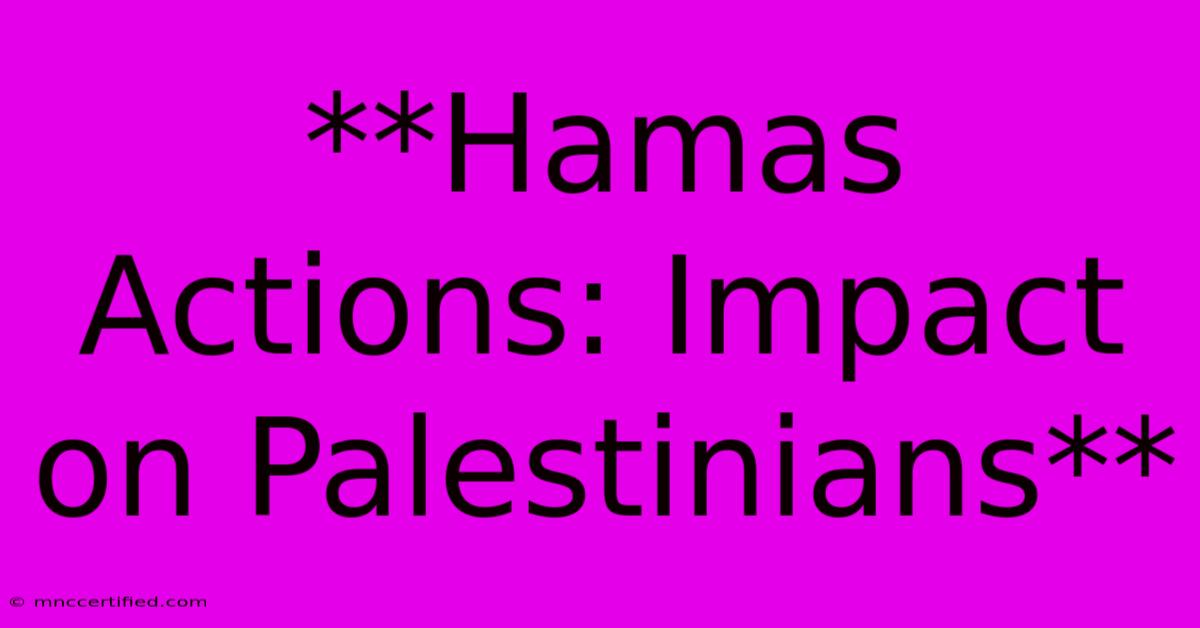**Hamas Actions: Impact On Palestinians**

Table of Contents
Hamas Actions: Impact on Palestinians - A Complex and Controversial Reality
Hamas, a Palestinian Islamic resistance movement, has been a significant player in the Israeli-Palestinian conflict for decades. Their actions, often controversial and highly debated, have had a profound impact on the lives of Palestinians. Understanding this impact requires navigating a complex web of political, social, and humanitarian factors.
The Political Landscape: A Divided Palestinian Society
Hamas's political ideology, rooted in Islamic fundamentalism, has contributed to the division within Palestinian society. Their control of the Gaza Strip since 2007 has created a separate entity from the West Bank, governed by the Palestinian Authority (PA). This division has hampered efforts towards a unified Palestinian leadership, hindering negotiations with Israel and limiting the potential for a lasting peace agreement.
Economic Challenges: A Struggle for Survival
Hamas's policies and actions have often resulted in economic hardship for Palestinians in Gaza. The ongoing blockade by Israel, coupled with Hamas's own internal governance issues, has led to a severe economic crisis. This has resulted in high unemployment rates, poverty, and a shortage of essential goods and services. The lack of economic opportunities within Gaza has also forced many Palestinians to seek refuge elsewhere, creating further displacement and hardship.
Security and Conflict: A Cycle of Violence
Hamas's military wing, the Izz ad-Din al-Qassam Brigades, is known for its armed resistance against Israel. While some Palestinians view Hamas's military actions as a necessary defense against Israeli aggression, others see them as counterproductive and contributing to a cycle of violence. The frequent rocket attacks from Gaza into Israel, and the subsequent Israeli military responses, have resulted in civilian casualties on both sides, furthering the humanitarian crisis and delaying any prospects for peace.
Social and Cultural Impacts: A Suppressed Palestinian Society
Hamas's social policies, influenced by its strict interpretation of Islamic law, have had a significant impact on Palestinian life in Gaza. The implementation of Sharia law, including limitations on personal freedoms and the suppression of dissenting voices, has raised concerns about human rights violations. This has created a climate of fear and repression, hindering the development of a vibrant and open society.
The International Perspective: Isolation and Sanctions
Hamas's actions, particularly its refusal to recognize Israel's right to exist and its use of violence, have led to its international isolation. The group is designated as a terrorist organization by many countries, including the United States and the European Union. These designations have resulted in economic sanctions and a lack of international support, further complicating Hamas's ability to govern and provide for its people.
Seeking a Way Forward: Navigating the Complexities
The impact of Hamas's actions on Palestinians is multifaceted and deeply interwoven with the larger context of the Israeli-Palestinian conflict. To find a solution that benefits all Palestinians, it is crucial to acknowledge the complexities of the situation and work towards a peaceful resolution that addresses the underlying causes of conflict. This requires:
- Promoting unity and reconciliation: Bridging the divide between Hamas and the PA is essential to achieve a united Palestinian voice and pursue a common agenda.
- Prioritizing economic development: Addressing the economic crisis in Gaza, through targeted investments and support for entrepreneurship, is crucial to alleviate poverty and provide opportunities for Palestinians.
- Ending violence and promoting dialogue: Working towards a cessation of hostilities and fostering meaningful dialogue between Hamas, Israel, and the international community is critical for creating a climate conducive to peace.
- Addressing human rights concerns: Ensuring the respect for fundamental human rights within Gaza, under Hamas's governance, is vital for creating a just and equitable society.
The path towards peace and prosperity for Palestinians is a long and challenging one, but by acknowledging the complex realities of the situation and working towards a solution that addresses the needs of all parties involved, there is hope for a brighter future for all.

Thank you for visiting our website wich cover about **Hamas Actions: Impact On Palestinians**. We hope the information provided has been useful to you. Feel free to contact us if you have any questions or need further assistance. See you next time and dont miss to bookmark.
Featured Posts
-
Bank Of England Rate Cut Financial Implications
Nov 08, 2024
-
Aclu Challenges Fulton County Plan
Nov 08, 2024
-
Do I Need Title Insurance If Paying Cash
Nov 08, 2024
-
Bailey Addresses Ddg Son Photo Controversy
Nov 08, 2024
-
Review The Day Of The Jackal Sky Atlantic
Nov 08, 2024